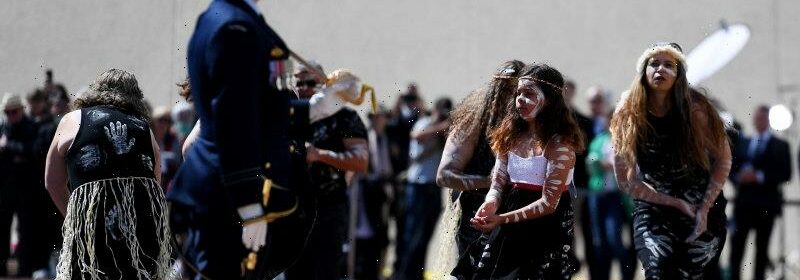‘We can’t mourn’: Queen’s death triggers Indigenous debate on legacy

The Queen’s legacy as a figurehead of colonialism has been condemned by some Indigenous Australians, but senior Aboriginal leaders have come to her defence, saying she inherited her role and was not to blame for past atrocities.
Prime Minister Anthony Albanese said he respected the right of Australians to hold different views as he restated his commitment to hold a referendum to enshrine an Indigenous Voice to parliament in the constitution during this term.
Members of the Yukembruk dance group perform at the proclamation ceremony in Canberra.Credit:Tracey Nearmy/Getty Images
“As prime minister, I’m not in a position to control people’s feelings, of course, and many of those will, of course, be heartfelt,” he told ABC Insiders.
“This nation didn’t begin in 1788, it goes back some 65,000 years at least. It should be a source of great national pride that we live and share this continent with the oldest continuous civilisation and culture on Earth.”
Aboriginal Tent Embassy ambassador Gwenda Stanley said she felt no grief at the Queen’s death and viewed her legacy as an embodiment of colonisation.
“We can’t mourn something that has colonised us for so many generations,” she said.
“[The monarchy’s] legacy is that they had a privileged life due to the benefit from the genocide of Indigenous people right around this country.
“If anything it’s [something] to rejoice for many colonies around the world. Although she had many visits to Australia, there’s still the injustice of the genocides that she’s going to her grave with.”
Coalition senator Jacinta Nampijinpa Price said she did not agree with this view, but rather was in “awe” of the way the Queen shouldered her responsibilities with “consideration, with poise and with grace” while being under intense public scrutiny.
“She inherited much of what the monarchy was part of, and had done worldwide. Given that position, I think she did quite well to serve the Commonwealth,” Price said.
“I know many Aboriginal people who hold a deep respect for her and her position.
“When it comes to other colonisers around the world, I think we ended up in the best position possible in terms of the British coming to the shores. It could have been far more disastrous for Indigenous Australians had we been met with the Spanish or the Dutch or anybody else.”
Sunday’s proclamation ceremony in Canberra, when Governor-General David Hurley declared Charles III the King of Australia, included a smoking ceremony, Welcome to Country and Indigenous dance.
Ngunnawal elder Aunty Violet Sheridan said it was a pleasure, “in keeping with the general spirit of friendship and reconciliation”, to welcome those attending the ceremony.
“I was born under her rule right up until she passed,” Sheridan said.
“No matter what your views, Queen Elizabeth lived a life of service and she was also a loving wife, mother, grandmother and great-grandmother.
“King Charles III takes over from his mother and we know he will be thoughtful in his rule.”
Indigenous leader Professor Tom Calma, the University of Canberra’s chancellor, met the Queen during her last visit to Australia in 2011 and said he held “no hostility” toward her and respected her long-term reign.
He said her legacy should be viewed in the context that she came to the throne more than a century and a half after the British colonised Australia.
“She didn’t colonise. She inherited the predicament we were in. Australia had already been colonised on beliefs that terra nullius existed – it didn’t, and it was overturned in 1992 in the Mabo decision by the High Court,” Calma said.
He said the Queen’s death should spark a discussion about the nation’s future, including the prospect of another referendum on whether to become a republic.
“Our future is in our hands and we have to think seriously about it as a nation. And, if a referendum comes up for a republic again, Australia needs to consider it.”
Macquarie University Indigenous studies professor Sandy O’Sullivan said there was a deep complexity of emotion among Aboriginal and Torres Strait Islander people to the Queen’s death.
“There are many [Indigenous Australians] who are very sad about the passing of the Queen, who felt she was important in their own agency. But the reality is that many others feel the monarchy was responsible for ongoing colonialism,” they said.
O’Sullivan said the monarchy had not done enough to recognise the impact of colonisation on Indigenous Australians or improve their plight.
“It was our land, and our land was used to develop these resources that built the British Empire. That has continued. It’s not like money was handed back or reparations were made. They weren’t.”
Cut through the noise of federal politics with news, views and expert analysis from Jacqueline Maley. Subscribers can sign up to our weekly Inside Politics newsletter here.
Most Viewed in Politics
From our partners
Source: Read Full Article
